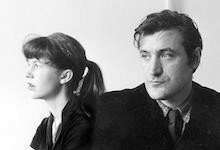Speaking in the voice of a generation
Ali Abdolrezaei began to concentrate on poetry in 1986 and has continued to write prolifically ever since. His poetry is both a continuation of the experimentation championed by Persian writers of the modernist period (1950–1979), and a reaction against traditionalist ideas implicit in classical Persian literature.
He was able to publish seven volumes of his work inside Iran. His last four poetry collections, published on the internet, mark a poetic as well as a literary watershed. With an additional volume of poetry awaiting publication, he is the most controversial of Iranian literary figures, both inside and outside the country. His poetry has challenged traditional Persian poetic language and has exerted a decisive influence on post-Revolution Iranian literature. Focusing on the feelings of anxiety, isolation and the sense of loss felt by Iranians, Abdolrezaei’s work places contemporary Iranian literature on the world stage and creates a greater opportunity for new Iranian voices to contribute to discussion about these challenging times. During the last fifteen years, his influence has extended across Persian poetic territories in Iran, Afghanistan and Tajikistan.
Suspended between a half-forgotten traditionalism and an anti-establishment modernism, the Iranian Revolution in 1979 initially won the heart and mind of the intelligentsia. Following the foundation of the Islamic Republic in 1979, the devastating eight-year war with Iraq, during which thousands of teenagers were lost to martyrdom, scarred the psyches of the younger generation for years to come. A distinct new poetry began to emerge nearly a decade later after the Revolution. Along with the progressive tendencies in secularism and human rights, an Iranian literary avant-garde began to take shape. This New Poetry movement grew from a body of ideas focused primarily, on individualism and imagined reality.
Abdolrezaei was one of the founders of the Persian New Poetry movement, the followers of which turned away from the legacy of modern Persian poetry. Relinquishing the idea that the aim of poetry should be to express high emotion and to portray forces of nature, they write about more immediate themes, in a more colloquial language firmly grounded in reality. Ali Abdolrezaei’s voice as a poet is clear and unmistakable; his style and subjects are completely his own. His strongest poems are often those which describe personal experiences rather than world events. He sees changes in the forms and subjects of literature as a way of helping political and social change, and this aspiration to change is reflected in the language of his poetry as well as the experiences it describes.
Early on in his career as a poet, Ali embarked upon a journey to force language into new forms to communicate new experiences. His poems centre on the problematic nature of language, knowledge and subjectivity. No singular construction of meaning emerges in his poems; knowledge and subjectivity co-exist; knowing is coupled with not-knowing and being with not-being. His poetic language is one that speaks of the impossibility of expression and, in so doing, exists in the space of its own negativity.
Abdolrezaei avoids, deliberately, confining himself and his creativity within the straitjacket of Persian orthodox tradition. Despite the risk of appearing eccentric or anarchic, he seems to speak to us from the depths of his solitude through schemata largely unmediated by social or literary conventions. His innovative forms and language and his sense of self-identity are interwoven and have been changing respectively as his poetry grows from strength to strength. He does not use traditional forms of rhyme and rhythm. His forms depend rather on the counting of syllables and the sound-patterns of the words, in a way which reflects the patterns of Old Persian poetry, prior to the Islamic era. At first, to a reader, his work is too obscure and dense. But its richness of imagery, its uniqueness of language and its sudden surprising shifts of diction are remarkably convincing as the dust of obscurity settles. His lengthy poems, in particular, are highly complex and often bring together a disparate group of characters. A guide is required to travel into this terrain, which has all the semblance of the old, and yet is new. It is precisely this novelty clothed in the familiar that puzzles but also reinforces the reader’s desire to explore further Abdolrezaei’s twilight zone.
Abdolrezaei is particularly aware that his poetry is destined to undergo transformations beyond his control. His resistance to having a biography written about him stems from his awareness of his own future literary metamorphoses. The Abdolrezaei we perceive as a poet is also the product of discourses, which run through and beyond him. In other words, the ‘I’ of the poet is fragmented and lives throughout a bundle of inter-related texts. Poetry is, primarily, a drama of the self and the act of writing, deals, in the first instance, with epistemology and matters of cultural perception and communication. Abdolrezaei’s poetry questions the stability of the identity of the writer and of the relationship between writer and critic.
Generally termed ‘postmodern Persian literature’, Abdolrezaei’s work is difficult to define in terms of its precise characteristics and scope. Certainly, though, the unifying features of Abdolrezaei’s poetry hinge upon the denial of what Jean-François Lyotard termed ‘meta-narratives’ and on ‘archetypal patterns’ as conceived by Carl Gustav Jung. Instead of pursuing the modernist quest for meaning in a chaotic world, his poetry eschews, often playfully, the possibility of clear-cut meanings.
The distinction between high and low culture is also attacked by the use of colloquial language and genres not previously deemed fit for Persian literature. His poetic imagery is consistent with contemporary life, representing the spontaneous expression of own thoughts and feelings, and in his poetry, there is a tendency to use personal and social references which a reader unfamiliar to Abdolrezaei and his work cannot place. Some critics have attacked certain lengthy poems as being verbose, disorganised, sterile and filled with language-play for its own sake. As a sharp-minded intellectual, Abdolrezaei plays with the multiplicity of words’ meanings and exposes the undesirable aspects of the Iranian status quo through a clever, and sometimes quite bewildering, use of the Persian language.
Among Abdolrezaei’s poems featured on PIW, his ‘At “The Priory”’ is often cited as characteristic of his style. This fragmentary poem employs pastiche to demonstrate that our lives are not the subject of random fate, but that reality is of our own making, shaped by manipulation of material events and emotions around us from a logo-centric point of view.
Perhaps challenged most famously, and effectively, by the poem ‘Mother me out!’ is the belief that there exists an ordered system behind the chaos of the world. For Abdolrezaei, though, no such system exists: a search for order is therefore fruitless and absurd. The poem ‘Junction’ seems to define the attitude of a generation exuding a much-needed confidence in an age that could easily descend into disillusion and decadence.
The self-conscious dialogue between the poet’s varied personae sets the tone of the poem ‘Dictation’. The poem interrupts itself twice with a third commanding voice while the poet looks back over his life. Although the poem is written in the first person, the reader learns little about the protagonist, who remains a representative figure. The ‘I’ of the poem can speak for all people because no particular identity is ascribed. The mood of the poem is almost tragic in the final stanza, which states that a new poem “always rubs out other poems”. Thus, the final line, “Poets! Stop writing hands up” can be read as a verdict that defeat and death are inevitable.
Abdolrezaei sees poetry as a vital part of the process of social transformation. His description of human hardship and suffering are not those of a man who can look at misery from a distance. In today’s Iran the right to freedom of expression is curtailed; thus poets cannot engage directly with critical political issues. In addition, general disillusionment with politics means political poetry is now largely unfashionable in Iran. The poets of the new order have an altogether sharper and more painful view of the suffering caused by a totalitarian regime seizing power in the wake of the 1979 Revolution. Among the poets of post-Revolutionary era, there exists a sense of hopelessness in the face of global and national events which they feel powerless to change or influence. Nonetheless, poetry remains a small voice of opposition which avoids attacking the abusing power head on, but shows it to be the crude bully that it is. Ali Abdolrezaei does not engage directly with politics yet is unable to ignore them. Distinctively representative of post 1979 Iranian literature, his poetry protests against social idealism. Much like that outburst of art, literature and philosophy in Europe following World War II, post-Revolutionary Iranian literature promises a new dawn.








